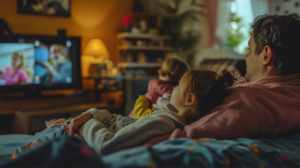Is It Bad for a Newborn to Watch TV? What New Moms Need to Know

When you’re rocking your newborn or feeding in the early morning hours, it might seem harmless to have the TV on in the background. After all, they’re so little—can they even see what’s happening on screen? If you’re wondering, is it bad for a newborn to watch TV, you’re not alone. Many new moms ask the same question. Let’s walk through what the research says, what pediatricians recommend, and how you can support healthy development in your baby’s earliest months.
Can Newborns Watch TV?
Technically, yes—a newborn can physically watch TV, in the sense that their eyes may be open and facing a screen. But just because they can, doesn’t mean they should. The American Academy of Pediatrics recommends no screen time for children under 18 months (except for video chatting with family). So if you’re asking “Can a newborn watch TV?”, the answer is: it’s not recommended.
Why Screen Time Isn’t Ideal for Newborns
Newborns’ brains are rapidly developing. During these early months, they learn best from real-life interaction: cuddling, eye contact, talking, singing, and responding to their cries. TV can interfere with these interactions. Even if a newborn seems uninterested in what’s on the screen, the flashing lights and background noise can distract both the baby and the parent, reducing the quality of bonding.
Potential Concerns:
- Overstimulation: Bright, fast-moving visuals can overwhelm a baby’s developing visual system.
- Reduced Language Exposure: Babies learn language by hearing and watching people speak directly to them. TV doesn’t provide this kind of learning.
- Interrupted Sleep Patterns: Exposure to screens, especially in the evening, can impact melatonin production and sleep quality.
What About Having the TV On in the Background?
Some moms ask, “If I’m not putting the baby in front of the TV, is background noise OK?” While this seems like a small compromise, research shows that background TV can still interfere with parent-child interaction. Parents tend to talk less to their babies and respond more slowly when a screen is on. And even though your baby isn’t watching, they still hear the sounds, which can interrupt their ability to focus on your voice.
What to Do Instead of TV
If you need to keep your baby occupied or soothed, there are great screen-free options that also support development:
- Soft music or lullabies
- Narrating your day (talking about what you’re doing helps develop language skills)
- Reading simple board books
- Gentle movement, like babywearing or swaying
- Skin-to-skin contact
These activities are not only calming but also build crucial brain connections in your baby’s first months.
Tips for Parents Who Need a Break
Let’s be real—sometimes, you just need a moment to drink your coffee or zone out for five minutes. And that’s OK. You can set your baby in a safe space like a crib or playmat while you rest. Just avoid placing them directly in front of a screen. Remember, your well-being matters too. Join us at a New Mom’s Social Club meeting, specifically intended for moms with babies up to 12 months of age. Here, we offer a safe space for you to talk to and relate with other moms feeling the same things as you are.
What Pediatricians Say About TV for Newborns
At PAK Pediatrics, we get this question a lot: Is TV bad for newborns? Our advice? Try to limit exposure as much as possible. The newborn stage is brief, but it’s an important window for sensory development and parent bonding. Reducing background TV and opting for face-to-face time instead supports your baby’s growth in the best way.
If you’re wondering what else to expect in these early weeks, check out our article on Questions for Newborn Pediatricians and How to Choose a Pediatrician for a Newborn. These are great reads for any parent navigating newborn care for the first time.
Screen Time and Future Development
There’s growing research that too much screen time in the first two years of life is linked to:
- Delayed language development
- Attention issues
- Behavioral challenges
- Decreased parent-child bonding
While occasional exposure isn’t likely to cause harm, regular screen time in infancy can set the stage for unhealthy habits later on. That’s why experts say it’s better to hold off until your child is developmentally ready.
Setting Healthy Habits from the Start
Establishing screen-free routines in the newborn phase makes it easier to manage screen use later on. Create a calm, engaging environment for your baby to explore the world naturally. You’ll build strong habits that benefit both you and your child in the long run.
Trust the Research, and Trust Yourself
If you’ve been asking yourself, is it bad for a newborn to watch TV, the research is clear—it’s best to limit screens and focus on real-life interaction instead. Babies thrive on eye contact, cuddles, and your voice. While there’s no need to panic if a screen was on in the background once or twice, being mindful of media exposure can help your baby grow and develop in the healthiest way possible.
Want more newborn tips and trustworthy guidance? Visit our main newborn care page, questions for newborn pediatrician page, how to choose a pediatrician for a newborn page, or check out our guide on Pediatrician vs Family Doctor for Newborn to make the best choices for your family.
Need help? Contact PAK Pediatrics today to schedule an appointment or prenatal consultation at any of our four NEPA locations. We’re here for you—and your little one—from day one.









